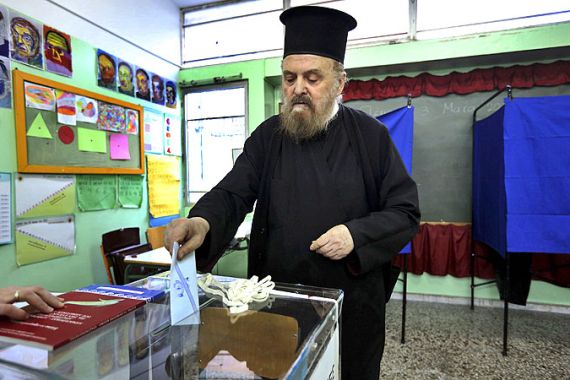‘Big losses’ for Greek pro-austerity parties
Exit polls show New Democracy and PASOK, parties which pushed for austerity measures, suffered major losses in ballot.

The Greek conservative and socialist parties have suffered massive losses in an election marked by anti-austerity anger, with a leftist party opposing EU-IMF reforms making gains, exit polls showed.
The conservative New Democracy and socialist Pasok are only expected to muster up to 37 per cent of the vote between them, with the leftist Syriza party leapfrogging to second place, the exit polls televised nationally showed.
The polls also showed the neo-Nazi Golden Dawn party will enter parliament for the first time in nearly 40 years.
The party is calculated to win between six and eight per cent of the vote on rising immigration and crime concerns, comfortably above the three-per cent threshold required for parliamentary entry.
PASOK and New Democracy have alternated in power since the end of a military junta in 1974.
Al AJazeera’s Barnaby Phillips, reporting from Athens, said: “On the face of it, this seems like massive repudiation of Greece’s political establishment.”
The result of the crucial vote could throw the debt-stricken country’s future into further doubt and shake the wider eurozone.
Greece has has had to endure belt-tightening measures in return for two bailouts worth $314bn.
PASOK booed
The head of PASOK, former finance minister Evangelos Venizelos, was booed and heckled as he cast his vote in Sunday’s election.
Five or six people on nearby balconies shouted “thief” and another said he was “forced to go to Germany to find work”,
said an AFP reporter at the scene.
|
|
Antonis Samaras, the leader of the New Democracy party, and Lucas Papademos, the outgoing technocrat prime minister heading the current interim government, also cast their votes early on Sunday.
Papademos said he expected a new government to be formed “this week” but opinion polls suggested this might be a tall order.
“We are all agreed that these elections are most crucial. Everyone has to make a decision, not just on who will govern but on what path the country will take in the coming decades.”
A candidate for one of Greece’s smaller centralist parties, Drasi, which has just stood for elections once before, said that Greece was entering a new era of politics.
He told our correspondent that he hoped this would create an avenue for new parties to be represented.
“There are voices that will do justice to a party system where the smaller parties may have a role play in a future goverment,” he said.
Long-running recession
He said that while austerity measures were uppermost in voters’ minds, the voters were fed up with decades of corruption and cronyism.
Greece has written off a third of its debts and is in its fifth year running of recession.
One in five workers is unemployed, its banks are in a precarious position, and pensions and salaries have been slashed by up to 40 per cent.
Both PASOK and New Democracy want the “troika” of the European Union, International Monetary Fund and European Central Bank to be more flexible with Greece in their bailout deals, but for many smaller parties this does not go far enough.
“We need to break from this corrupt political system of lackeys of foreign imperialism,” Petros Alachmar, 31, an activist from the far-left Syriza party, told the AFP news agency. “We have had enough of austerity measures.”
But with Athens having committed to finding in June another $15bn in savings through 2014, any ambition to renegotiate terms “suggests a degree of liberty they do not have,” Swiss bank UBS said in a research note.